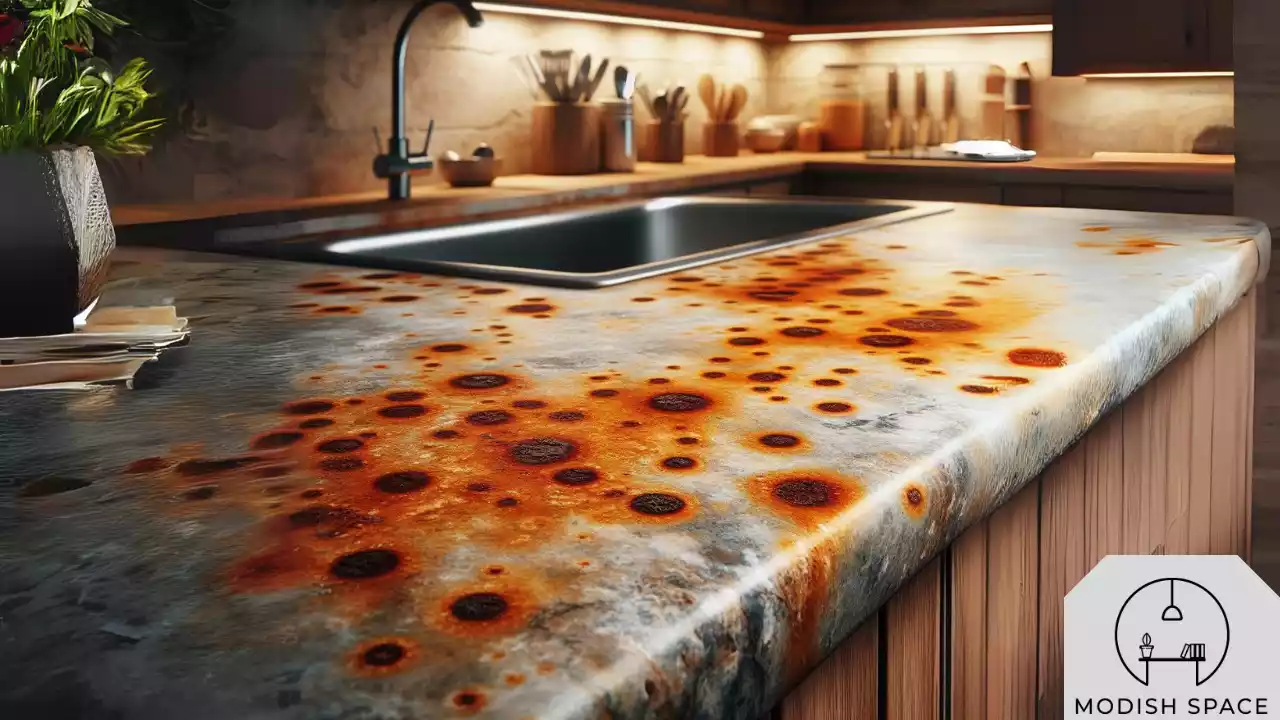Suppose you have spent some serious money to install a white marble countertop. Yet you are seeing some orange spots on kitchen countertops started showing some orange spots just weeks and months into using it.
You may be unhappy over this matter and blame yourself for causing the stain, but how did it happen? Why does your kitchen countertop get orange spots?
Your stone kitchen countertop may have orange spots due to rusting iron deposits. Natural stone countertops do contain iron, and rusting can happen. Orange spots could also be rust stains, common with wood or laminate countertops.
In this article, we explore why your kitchen countertop gets orange spots and if it is a good idea to leave it as is. If you prefer to remove it, we also share how you can do so.
Why Do Kitchen Countertops Get Orange Spots?
Orange spots on kitchen countertops may mean rust. The rust may be from the iron inside the stone countertops. On wood or laminate countertops, there could be rust deposits on the surface.
Generally, most of the orange stains may point to rust. However, before you stress out and think that your countertops may break, they will not.
This is because the rust spots do not cause the countertop to lose structural strength. They are mostly just aesthetic annoyances. These stains may be caused by the following:
Iron Oxidation
Suppose your kitchen countertops are made from stones such as granite, marble, or quartz. In this case, the orange spots may point to rust.
If you are wondering why stone rusts, it is because, in many natural stones, iron deposits are inside. When the stones are processed, they are usually cut into countertops. This means some of these iron deposits may become exposed to the air.
Over time, these iron deposits interact with air and humidity, causing them to oxidize. As iron oxidizes, they turn into iron oxide, which is essentially rust. These rusts show up on your kitchen countertop as orange spots.
Rust Stain
Suppose your kitchen countertop’s materials are non-stone types. For example, wood or laminated plastic. In this case, the orange spots may also mean rust.
However, the rust spots may not have a similar origin as stone countertops. The rust spots for these non-stone countertops may come from external sources.
Sometimes, these rust spots may come from the containers used to store your kitchen utensils. Over time, some of the iron on the containers or utensils oxidize. These rusts flow with the water from your wet utensils and get deposited on your countertop.
Are These Orange Spots Dangerous To Your Health?
Orange or rust spots on kitchen countertops may or may not be dangerous to health. If rusting happens inside the countertop, they should be safe. But, if the rusting is on the surface, it can contaminate food and utensils, posing a potential health risk.
In general, rust in a small amount does not pose a significant health risk to human beings. This is contrary to common beliefs that rusts may cause tetanus. In truth, tetanus is not caused by rust but by the bacteria that may have lodged into the rusty object.
However, we should reduce exposure to rust whenever possible. Skin contact does not pose an issue, but we want to avoid ingesting them.
Suppose your kitchen countertops are made of natural stones. With these stones, rusting may usually happen inside the stone. This means the rust marks are not on the surface, and you cannot wipe them away.
This means the rust will be contained inside the stone and not contaminate anything. You should be fine to leave the rust spots as is.
However, if the rust spots are on the surface, you may want to remove them. This is because rust can contaminate your utensils, food, or cutlery. This may be the case if your kitchen countertops are made of wood or laminate plastic.
How To Remove Orange Spots From Kitchen Countertops?
To remove surface rust from countertops, use baking soda and lemon juice. You may need to drill and remove the rust if the orange spots are inside the countertop. Then you fill the spot with fillers or epoxy.
Suppose you cannot tolerate the orange spots on your kitchen countertop. You may also prefer to remove it for health and safety reasons.
In this case, you can remove the rust stains easily if it is on the countertop’s surface. If inside, however, it will be quite a serious project.
Removing Rust Spots From Kitchen Countertop Surface
To remove rust spots from the surface of kitchen countertops:
- Start by cleaning the surface. Wipe with a damp cloth to remove dust, debris, or grime.
- Pull out a plastic scraper or a butter knife if the rust spots are thick. Scrape to remove loose or flaky rust from the countertop surface.
- Squeeze in some lemon juice directly on the stain, and let it sit for up to 15 minutes.
- Squeeze in additional fresh lemon juice on the surface, and add baking soda. Mix to turn the baking soda and lemon into a paste.
- Scrub the surface using a scrub brush. Scrub in a circular motion for better results.
- Rinse the surface with water and observe if the rust mark remains.
- Repeat steps 3 to 6 until all rust marks are removed.
- Wipe down the surface with a dry cloth, and allow it to air dry.
- Enjoy!
Removing Rust Spots Inside Kitchen Countertops
If the rust spots are inside the kitchen countertop, removing them may require a more serious operation. Considering the cost of a natural stone countertop, it may make sense to engage a professional instead.
A professional may first drill into the countertop to reach the rust spot and then clean and remove it. The drilled spot may then be refilled with a refiller and epoxy.
However, it may make sure to learn to appreciate the spots as natural imperfections. This is because the rust spots do not pose any health risks.
Final Thoughts
Discovering orange spots on your kitchen countertop can be a frustrating and confusing experience.
While it may be tempting to immediately blame yourself or your cleaning habits, the truth is that orange spots can occur due to natural iron deposits in the stone or as a result of rust stains. Regardless of the cause, it is important to carefully consider the best course of action for your specific countertop and its material.
Whether you choose to leave the spots or remove them, knowing the cause and potential solutions can help you make an informed decision and keep your kitchen looking its best.

